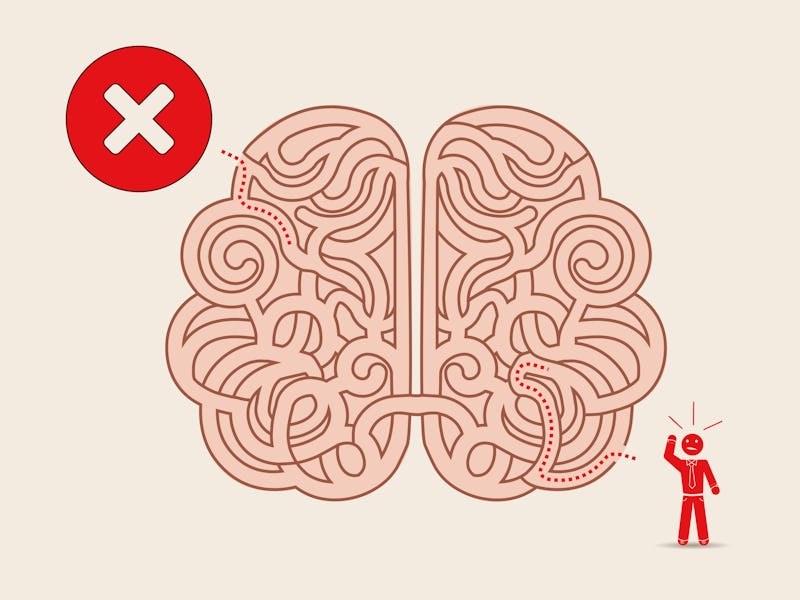Innovative decision-making study could lead to better therapies for OCD
Novel research provides a "new perspective" on obsessive-compulsive disorder.

People with obsessive-compulsive disorder (OCD) are often misconstrued as simply having a deathly fear of germs or a penchant for excessive tidiness. In reality, the disorder is much more complex, and the cause remains to be unknown.
Often, the human brain can overcome worries and fears by casting the mind back to past experiences that have worked out just fine. A new study suggests that people with OCD have difficulty with this process not because they are inflexible, but because of an extreme difficulty trusting acquired experience.
Some of the behaviors and habits that accompany the disorder can be explained by one of its hallmark symptoms: indecisiveness. People with OCD often exhibit pathological doubt — picking out an outfit in the morning or choosing between two brands of laundry detergent at the store can be frustrating back-and-forths.
This is because sufferers of OCD, which is thought to affect up to 2.3 percent of the world’s population at one point in their lives, have a strong tendency to worry about the uncertainty of the future. This can take the form of constantly seeking reassurance from others, checking and rechecking facts, or weighing up every available option, multiple times.
“Individuals with OCD have well-documented difficulties with resolving uncertainties,” Helen Pushkarskaya, a researcher at Yale School of Medicine who studies the neurobiology of decision-making, tells Inverse. “This paper provides a new perspective on what difficulties may contribute to it.”
These results don’t challenge previously proposed ideas about the cognitive difficulties linked to OCD, Pushkarskaya notes. Instead, the results build upon what is already known — and suggest a new interpretation of why people with OCD may over-rely on past experiences.
The findings were published Thursday in the journal PLOS Computational Biology.
Distrust of the past
In the study, 58 people with varying degrees of obsessive-compulsive symptoms were instructed to complete a decision-making task, in which they were asked to consider the degree of importance they give prior experiences and judge that against the importance given to more recent observations.
This involved the patients being presented with three arrows, pointing either left or right. They were informed that one of the arrows would predict the location of the target — a black circle. They were also told that, every so often, the arrow that was making the prediction would change, and another arrow would take up its role. The participants were instructed to then predict the location of the black circle by pressing the left or right arrow before it appears.
Some areas that show unique activity in the brains of people with OCD.
The researchers performed a computational analysis in order to decipher whether the patients with higher obsessive-compulsive tendencies showed a higher level of distrust towards their previous experiences. In other words: Could they use what they had learned from previous trials of the task to make an informed decision when selecting an arrow that would predict the target?
They found that these participants indeed were less trusting of their knowledge of the past, and this left them “constantly uncertain, indecisive and exploratory” during the task.
Other studies have suggested that this inability to make decisions in people with OCD is caused by inflexibility, but this new research proposes this not to be true. These results “stand in stark contrast with the common preconception of OCD as being characterized by inflexible behavior, distinguished by overreliance on past experience,” the lead author of the paper, Isaac Fradkin of The Hebrew University of Jerusalem, Israel says.
Going forward, these new findings could have the potential to be used to design novel treatments for OCD. “Future direction may involve reconsidering habitual and ritual behaviors in OCD in the context of difficulties with resolving transitional uncertainties,” Pushkarskaya says.
Abstract: Obsessive-compulsive (OC) symptoms involve excessive information gathering (e.g., checking, reassurance-seeking), and uncertainty about possible, often catastrophic, future events. Here we propose that these phenomena are the result of excessive uncertainty regarding state transitions (transition uncertainty): a computational impairment in Bayesian inference leading to a reduced ability to use the past to predict the present and future, and to oversensitivity to feedback (i.e. prediction errors). Using a computational model of Bayesian learning under uncertainty in a reversal-learning task, we investigate the relationship between OC symptoms and transition uncertainty. Individuals high and low in OC symptoms performed a task in which they had to detect shifts (i.e. transitions) in cue-outcome contingencies. Modeling subjects’ choices was used to estimate each individual participant’s transition uncertainty and associated responses to feedback. We examined both an optimal observer model and an approximate Bayesian model in which participants were assumed to attend (and learn about) only one of several cues on each trial. Results suggested the participants were more likely to distribute attention across cues, in accordance with the optimal observer model. As hypothesized, participants with higher OC symptoms exhibited increased transition uncertainty, as well as a pattern of behavior potentially indicative of a difficulty in relying on learned contingencies, with no evidence for perseverative behavior. Increased transition uncertainty compromised these individuals’ ability to predict ensuing feedback, rendering them more surprised by expected outcomes. However, no evidence for excessive belief updating was found. These results highlight a potential computational basis for OC symptoms and obsessive-compulsive disorder (OCD). The fact the OC symptoms predicted a decreased reliance on the past rather than perseveration challenges preconceptions of OCD as a disorder of inflexibility. Our results have implications for the understanding of the neurocognitive processes leading to excessive uncertainty and distrust of past experiences in OCD.